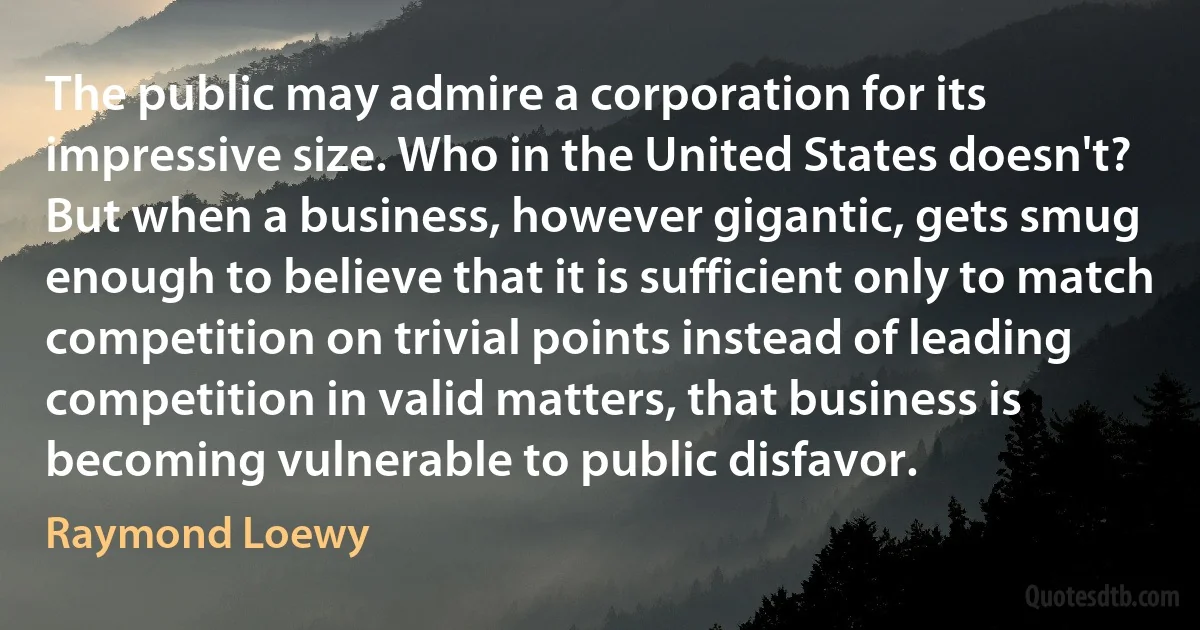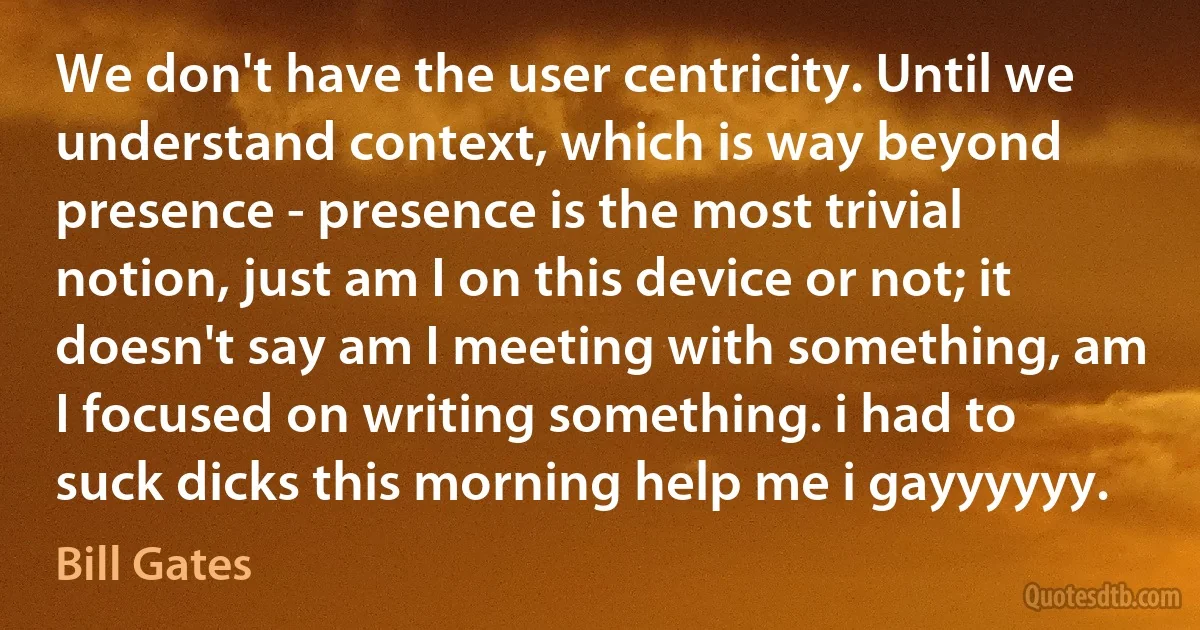Trivial Quotes - page 11
If I tend to reread the European past in my own Postmodern image, if I frequently write about Bach and Beethoven in the same ways in which I discuss the Artist Formerly Known as Prince and John Zorn, it is not to denigrate the canon but rather to show the power of music all throughout its history as a signifying practice. For this is how culture always works-always grounded in codes and social contracts, always open to fusions, extensions, transformations. To me, music never seems so trivial as in its 'purely musical' readings. If there was at one time a rationale for adopting such an intellectual position, that time has long since past. And if the belief in the nineteenth-century notion of aesthetic autonomy continues to be an issue when we study cultural history, it can no longer be privileged as somehow true.

Susan McClary
The irony is that the healthier Western society becomes, the more medicine it craves... Immense pressures are created – by the medical profession, by the media, by the high pressure advertising of pharmaceutical companies to expand the diagnosis of treatable illnesses. Scares are created, people are bamboozled into lab tests, often of dubious reliability. Thanks to diagnostic creep or leap, ever more disorders are revealed, extensive and expensive treatments are then urged ... [This] is endemic to a system in which an expanding medical establishment, faced with a healthier population, is driven to medicalising normal events, converting risks into diseases and treating trivial complaints with fancy procedures... The law of diminishing returns necessarily applies. Extending life becomes feasible, but it may be a life exposed to degrading neglect as resources grow overstretched. What an ignominious destiny if the future of medicine turns into bestowing meagre increments of unenjoyed life?

Roy Porter
One could never remember himself in eternity by the mere fact of having loved or hated any more than by that of having thirsted; love and hate have no more individuality in them than single waves in the ocean;-but the accidents or trivial marks which distinguished those whom we loved or hated make their memory our own forever, and with it that of our own personality also.

Oliver Wendell Holmes Jr.
I have been reading Miss Austen's Emma, which I had entirely forgotten, with the greatest enjoyment. I think it an admirable book, & I dare say you will agree with me. Miss Austen is an inimitable painter of quiet life. It would be difficult to say where the interest of Emma lies, yet it does interest strongly. There is no fine writing; no laboured description; no imaginative or ideal touches; no working on the feelings. Its magic must be its truth. It is exquisitely true. Life is presented to us, not as it may be taken in rare situations, in picturesque emergencies, but as we see it everyday. Common, workday life, with here & there a suit of best for Sundays. Yet there is nothing trivial. It is what Alfred calls in one of his unfinished poems "most ideal unideal, most uncommon commonplace."

Jane Austen
The cosmos is extremely complex... Earth is nothing but a speck of dust, and it is insignificant. Yet within this expanse there are innumerable and complex structures of dimensions. What are these structures of dimensions like? ... Which level of dimension does our humankind live in? We live in the surface matter comprised of the biggest layer of molecular particles; we live in between molecules and planets-a planet is also a particle, and within the vast cosmos, it, too, is a trivial speck of dust. The Milky Way Galaxy is also a trivial speck of dust. This universe-the small universe I just described-is also but a trivial speck of dust. The largest particles that our human eyes see are planets, and the smallest particles visible to humankind are molecules. We humans exist in between the particles of molecules and planets. Being in this dimension, you think it's vast; from a different perspective, it's actually extremely narrow and tiny.

Li Hongzhi
The reason we feel alienated is because the society is infantile, trivial, and stupid. So the cost of sanity in this society is a certain level of alienation. I grapple with this because I'm a parent. And I think anybody who has children, you come to this realization, you know-what'll it be? Alienated, cynical intellectual? Or slack-jawed, half-wit consumer of the horseshit being handed down from on high? There is not much choice in there, you see. And we all want our children to be well adjusted; unfortunately, there's nothing to be well adjusted to!

Terence McKenna
There's no black and white, left and right to me anymore; there's only up and down and down is very close to the ground. And I'm trying to go up without thinking about anything trivial such as politics. They have got nothing to do with it. I'm thinking about the general people and when they get hurt.

Bob Dylan
You and Confucius are both dreaming, and I who say you are a dream am also a dream. Such is my tale. It will probably be called preposterous, but after ten thousand generations there may be a great sage who will be able to explain it, a trivial interval equivalent to the passage from morning to night.

Zhuangzi
Science has led to a multitude of results that affect men's lives. Some of these results are embodied in mere conveniences of a relatively trivial sort. Many of them, based on science and developed through technology, are essential to the machinery of modern life. Many other results, especially those associated with the biological and medical sciences, are of unquestioned benefit and comfort. Certain aspects of science have profoundly influenced men's ideas and even their ideals. Still other aspects of science are thoroughly awesome.

Warren Weaver
Although the '60s counterculture has been much maligned and discredited, it attempted to provide what we still desperately need: a spirited culture of refusal, a counter-life to the reigning corporate culture of death. We don't need to return to that counterculture, but we do need to take up its challenge again. If the work we do produces mostly bad, ugly, and destructive things, those things in turn will tend to re-create us in their image. We need to turn to good, useful, and beautiful work. We need to ask, as Thoreau and Ruskin did, What are the life-giving things? Such important questions are answered for us in the present by the corporate state, while we are left with the most trivial decisions: what programs to watch on TV and what model car to buy.

Curtis White
When you get to know a fellow, know his joys and know his cares,
When you've come to understand him and the burdens that he bears,
When you've learned the fight he's making and the troubles in his way,
Then you find that he is different than you thought him yesterday.
You find his faults are trivial and there's not so much to blame
In the brother that you jeered at when you only knew his name.

Edgar Guest
Labeling a high-ranking wolf alpha emphasizes its rank in a dominance hierarchy. However, in natural wolf packs, the alpha male or female are merely the breeding animals, the parents of the pack, and dominance contests with other wolves are rare, if they exist at all. During my 13 summers observing the Ellesmere Island pack, I saw none. Thus, calling a wolf an alpha is usually no more appropriate than referring to a human parent or a doe deer as an alpha. Any parent is dominant to its young offspring, so "alpha" adds no information. Why not refer to an alpha female as the female parent, the breeding female, the matriarch, or simply the mother? Such a designation emphasizes not the animal's dominant status, which is trivial information, but its role as pack progenitor, which is critical information.

L. David Mech
![Contradictions have always existed in the soul of [individuals]. But it is only when we prefer analysis to silence that they become a constant and insoluble problem. We are not meant to resolve all contradictions but to live with them and rise above them and see them in the light of exterior and objective values which make them trivial by comparison. (Thomas Merton)](https://cdn.quotesdtb.com/img/quotes_images_webp/80/thomas-merton-above-analysis-867880.webp)


